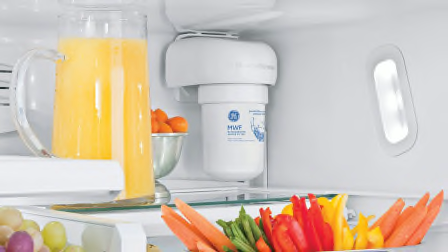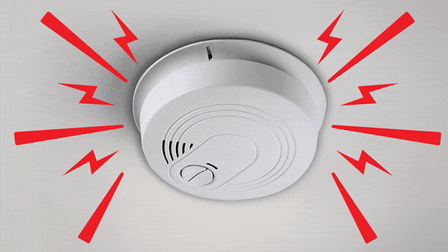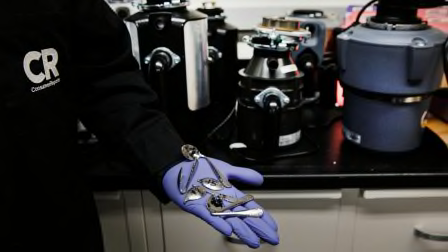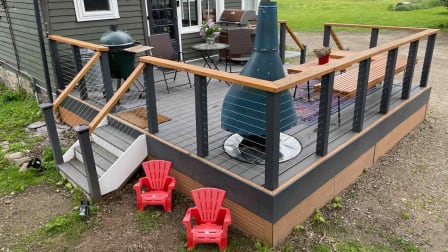How to Handle a Home Service Call During the Coronavirus Pandemic
From broken appliances to downed internet, some service calls can't wait. Here's how to ensure everyone's safety.
The TV remote didn’t seem to work, and the web pages on our laptops froze. We checked our phone line: Dead. One Saturday evening in March, as my husband and I were settling in to watch “Goodfellas” for the fifth time, our triple-play bundle—cable, internet, and phone service—failed.
As residents of Westchester County, N.Y., just north of the state’s coronavirus pandemic epicenter, we were into our third week of working from home, minimizing grocery shopping trips, and avoiding face-to-face contact with others. Now, suddenly, our lifeline to the outside world was gone.
I was wary of rebooting or unplugging anything without guidance. On my smartphone I typed the problem into Verizon’s self-help bot but didn’t find an answer. I located the company’s chat line but found it unresponsive. I reached a representative Monday morning, when live help resumed for the week, and was told we’d need a service call—and that the technician would come the next day. So on Tuesday morning, the company dispatched a worker to get our system up and running again.
In the prepandemic world, hosting a repairperson, handyman, or contractor would have meant checking ID at the door, asking the pro to wipe his feet before entering, and talking face-to-face about the issue at hand. But in the new reality of the coronavirus, there was so much more to think about.
1. Scheduling the Visit
Be honest about your exposure. The Verizon rep I initially reached asked whether anyone in our household had been diagnosed with COVID-19 or was being quarantined for potential exposure to the virus; a text on the day of the service call asked the same. I truthfully answered no. If you’ve been exposed or diagnosed, you may be tempted to withhold that information; that not only is unfair to the worker but also could backfire on you.
“If an employee doesn’t feel comfortable entering a home, we ask them to reschedule the delivery for another date,” says Jon Abt, co-president of Abt Electronics, which sells and installs major appliances, as well as electronics and home goods, and is based in Chicago.
On the flip side, you may wonder whether the worker coming to your door might not be disclosing his or her own virus exposure (perhaps because the person has no paid sick leave). There’s no guarantee the person is virus-free, but it’s worth noting that the $2 trillion Take Responsibility for Workers and Families Act, signed into law last Friday, mandates that all workers, regardless of employer size or occupation, are eligible for two weeks of emergency paid sick leave and 10 weeks of paid family and medical leave, among other measures.
Request a touch-free transaction. One study has shown that the coronavirus could remain on some surfaces for hours or even days. To avoid contact with potentially tainted surfaces, ask in advance whether documentation and sign-off can be done without exchanging paper or writing implements. Lowe’s, for one, told us it is temporarily allowing customers to leave receipts unsigned.
Ask about precautions. You could, for instance, ask the representative on the phone what the company mandates that its service workers do when entering the home to maintain a 6-foot distance. You also could ask to have the service person call or text you before arriving to go over precautions.
“In certain cases, our technician will have the customer open the door and then walk away from it to maintain social distance,” says David Moreno, chairman and co-founder of Liberty Home Guard, a home-warranty company, based in New York City, that sends independent contractors to make repairs for policyholders. Moreno has himself been at home with COVID-19 since March 14. “There have been a lot of takeaways from this situation, personally and professionally,” he says.
You might feel the need to ask in advance whether a company’s service personnel will wear a face covering. I felt better having masks, left over from a dusty home improvement project, on hand for me, my husband, and the Verizon worker. (The CDC now recommends the use of cloth, nonmedical face coverings in public to help contain the spread of the coronavirus.)
And any time a repairperson or installer touches a tool and leaves it on a surface in your home, there’s a chance for a virus he may unknowingly be harboring to remain. So when you’re making your appointment, ask whether the worker will use an appropriate disinfectant to clean tools and other supplies in your home, before and after use. The retailer Abt says it requires that of its personnel, among other precautions. A Home Depot spokesperson told us: “We’re limiting the number of installers in the home and sanitizing job sites while working.”
On a COVID-19 FAQ page for consumers, Verizon says it is minimizing in-home installation work to keep employees and customers safe, but it doesn’t mention service visits. In an email, spokesperson Adria Tomaszewski told me that for “critical” service needs, Verizon has asked all employees to report to the company if they do not feel well and to stay home until they are better. “We also reach out to customers who have an appointment scheduled to let us know if they are quarantined,” she said. “In the event they are, we reschedule the appointment. Any customer that has an appointment and does not want one of our technicians to enter their home for any reason, we reschedule the appointment.”
(The company’s COVID-19-related web page for employees, updated April 6, says that washing bare hands offers more protection from catching COVID-19 than using nitrile, surgical gloves but offers best practices if employees want to wear them. It also cites the CDC’s recommendation to all Americans to wear face coverings whenever in a public setting in which social distancing is difficult to maintain.)
2. Preparing Your Home
Chart a path. Plan how you’ll direct the person through your home, and where to suggest she put her tools. You’ll want to make sure that she doesn’t go into rooms or touch items in your house unnecessarily and that her own items touch a minimum of surfaces. (My husband and I agreed in advance, for instance, that he would handle the remotes if the Verizon guy needed to test the system.) Proactively moving items that block access to the ailing appliance also will ensure that the worker touches less and spends less time in your home, says Bryan Bennett, president of AdvantaClean, which does residential air duct cleaning and mold remediation services and is based in Huntersville, N.C.
Prepare the work area. Amna Husain, M.D., a pediatrician at Pure Direct Pediatrics in Marlboro, N.J., recommends precleaning the area where the worker will be based, with a cleaner known to kill the virus. That protects the service pro in the event the virus is in your home, even if you’re not aware of it.
You can also lay floor protection: disposable paper or plastic, or a washable sheet on which the worker can walk and place her tools. You can clean under there afterward. “There’s no scientific evidence that the virus is spread by walking on a floor or fabric, but that kind of barrier could limit exposure,” says Armstrong, the nursing professor.
Have hand soap and cleaners ready. You can offer them to the service worker before and after the job is done. (You’ll want to disinfect the wash basin afterward.)
3. During the Visit
Stand 6 feet back. The 6-foot rule and hand cleaning form the basis of all good COVID-19 hygiene, the CDC says. Our Verizon worker arrived early while I was out for a walk; my husband sat across the room from him while he worked. The worker accepted the mask he was offered but had no gloves—ostensibly because they would have made it hard to work with the wires he needed to touch. If the contractor in your home doesn’t have gloves, ideally he will wash his hands or use hand sanitizer before and after doing his work.
Protect your hands. If you have to hand something to the worker, use nonpermeable, disposable nitrile gloves or a paper towel to cover the item when you pass it. Then wash your hands vigorously, for good measure. If you must sign something, use your own pen or stylus (for touch screens).
Tip with care. If you’d like to thank the worker this way, put the money in a sealed envelope and place it on a surface for her to pick up. You can also ask for the worker’s name so that you can write a compliment on social media or on a follow-up communication with the company.
If you want to use a mobile peer-to-peer payment app, such as Apple Pay or Venmo, to tip someone, do it while the person is in your presence and confirm every detail before you send the money to make sure that it goes to the right person, recommends Christina Tetreault, senior attorney at Consumer Reports. (CR doesn’t recommend paying strangers this way because it can lead to scams and fraud, though the risk is greater with strangers you’re not dealing with face to face, Tetreault says.)
4. After the Visit
Wash your hands again. You can never do this too much. “It always goes back to hand hygiene,” Armstrong says.
Clean where the contractor was working. Ideally, clean 6 feet around the repairperson’s path, Armstrong says. See CR’s list of household cleaning products you can use to kill the virus.
After the Verizon worker left, we realized we’d used the last of our Clorox wipes. So I used paper towels and rags soaked in isopropyl alcohol, wiping down counters, chairs, and tables that he passed. I hesitated before wiping down a wooden table; I was concerned about the effect on the finish. I did it anyway, and yes, it left some faint, white streaks. I wondered what I could have done differently, and whether it was necessary at all. And I realized too late that I missed a glass table and didn’t wash down the wood floor.
Those kinds of conundrums are now part of everyone’s everyday life, Armstrong says.
“If we knew more about exactly what the virus does, how it spreads, we’d have more answers about what to do,” she says. “Everything is new. We’re all learning from our own mistakes.”
What I did learn—and what many people in the U.S. are learning—is that we’re going to have to approach daily life differently for the foreseeable future. Thankfully, I can research what to do with more ease now. We have our internet back.

















